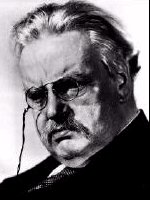 Manalive may just be my favorite G.K. Chesterton novel though, being one of his early works, his understanding of the details, scope and consistency of Christianity had not yet fully matured. Nevertheless, the explosive enthusiasm for life that is a staple of Chesterton (and, of course, a foundational element of Christianity) receives perhaps its most rollickingly, raucous expression in Manalive.
Manalive may just be my favorite G.K. Chesterton novel though, being one of his early works, his understanding of the details, scope and consistency of Christianity had not yet fully matured. Nevertheless, the explosive enthusiasm for life that is a staple of Chesterton (and, of course, a foundational element of Christianity) receives perhaps its most rollickingly, raucous expression in Manalive.Because of this as well as numerous other elements which extol the virtues of the Faith, this lively novel deserves to stand alongside Chesterton’s more overtly Christian literature.
Manalive was the novel under discussion last Thursday night at the 20th Century Christian Writers course I’m teaching this semester at Grace University. (See the descriptive post here.) The week earlier the class had discussed several of GK’s poems, essays and the intriguing short story featuring Father Brown, The Oracle of the Dog.
We had a good time that first evening but, as many of you know, reading Chesterton for the first time can be a pretty wild thing – an experience not unlike the wind of “unreasonable happiness” that opens the story of Manailve, a bracing, intoxicating wind that “refreshed like a flagon and astonished…like a blow.” Yes, one’s first encounter with GK Chesterton can be very much like the Manalive characters first encounter with the protagonist, Innocent Smith. But most of the students managed to hang on well to their hats (and even their heads) with the result that I think there may be at least a couple of fledgling Chestertonians among the group. We’ll see.
Anyhow, I asked the students to give me a brief review/recommendation of Manalive, letting them know that their efforts just might convince me to feature them as “guest bloggers” here at The Book Den. I believe you’ll agree that the three I selected well deserve the opportunity. Here they are:

Bethany Epps wrote -- When I first began to read Manalive by G.K. Chesterton, it struck me that I did not know at all what to expect from this book. Throughout my reading I was never bored for it was not like any other book I had ever read. The character Innocent Smith had quite a childlike simplicity, while also displaying unusual intelligence and a novel way of thinking. I appreciated the focus of the novel as emphasizing the need to enjoy life as it was meant to be lived.
Concerning the author, G.K. Chesterton, I personally believe he may have been an extraordinary creative person. To have written a story such as this, which contains so many hidden truths and turns, he must really stand out from other writers. I also fancy that he was a down-to-earth person, one who enjoyed the simple things in life. This can be seen perhaps most readily from one of his essays, “On Running After One’s Hat.” In fact, most of Manalive reminded me of this essay…and that’s a very good thing! I appreciate Chesterton’s contribution to literature.
From Rebekah Munnell -- The book Manalive is an interesting story about a man named Innocent Smith. He comes to a boarding house one day and drastically changes the lives of the people there. During the story, Smith ends up being charged with attempted murder, burglary, and polygamy. His friends at the boarding house decide to have a trial of sorts.
During the trial a series of letters are read both condemning and pardoning Mr. Smith. It is discovered that he wasn’t trying to kill anyone, the home he “broke into” was his own, and the woman he wanted to elope with was already his wife!
Innocent Smith is a very interesting character with childlike tendencies as well as the desire and ability to do anything on a whim. His somewhat crazy and whirlwind life gives testimony to this.
As for those in the boarding house, their experience with Innocent Smith changed their entire way of thinking -- and caused them to be a little more like him. I imagine their lives have been much different after his departure.
And finally, here's a really fine piece from senior, Nick Kaiser -- Manalive is a story that is anything but ordinary. Written by G.K. Chesterton, this conglomeration of mishaps and adventures defies conventional style. It describes the profound impact that a stranger, Innocent Smith, has on the inhabitants of an English boarding house.
Smith is a giant of a man with a child’s heart and love of life. His actions seem backwards to those he meets but his zaniness eventually inspires meaningful action in them all. Whether he is shooting at friends, chasing hats in the wind, or leaving his home to find it, Smith’s questionable actions always live up to his namesake: they are
 innocent.
innocent.Nuggets of wisdom abound amidst the ever-present chaos. One of my favorites comes from a conversation between Arthur Inglewood, an insecure man, and Diana Duke, a beautiful busybody who is anything but womanly…
“You are busy,” said Arthur, oddly embarrassed with what he had seen, and wishing to ignore it.
“There’s no time for dreaming in this world,” answered the young lady with her back to him.
“I have been thinking lately,” said Inglewood in a low voice, “that there’s no time for waking up.”
“There’s no time for dreaming in this world,” answered the young lady with her back to him.
“I have been thinking lately,” said Inglewood in a low voice, “that there’s no time for waking up.”
Expect what you don’t and be prepared for a real adventure if you pick up this book. Perhaps Innocent’s ways will rub off on you too.